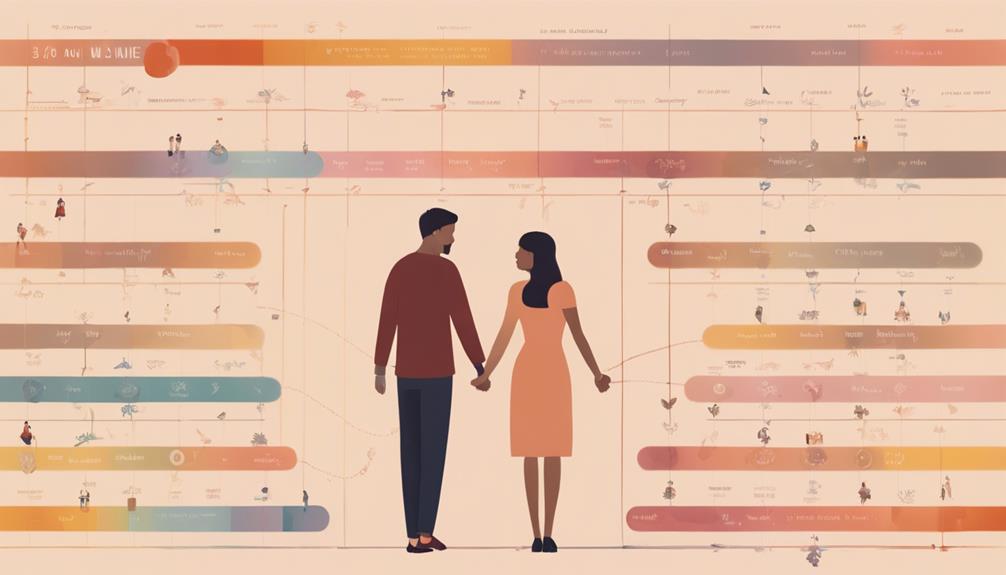Five years is often enough time to decide on engagement. You’ve likely experienced different life phases together and observed one another’s values, emotional maturity, and compatibility. Most couples tend to get engaged after two to five years, so taking five years aligns with common relationship timelines. This period helps you evaluate your readiness for long-term commitment, ensuring you’re both prepared to handle future challenges. Society might pressure engagement sooner, but it’s essential you follow your personal journey. If you’re considering an engagement, understanding these dynamics and what they mean for your relationship can provide clarity on your path forward.
Understanding Relationship Timelines

When it comes to understanding relationship timelines, many couples find themselves asking, “How long should we date before getting engaged?” While there isn’t a one-size-fits-all answer, a common trend shows that most couples date for about 2 to 5 years before deciding to get engaged.
This dating timeframe allows couples to explore their compatibility and readiness for commitment. Research indicates that roughly 70% of couples choose to get engaged after a relationship length of two years or more, suggesting that this duration often provides sufficient insight into each other’s values and life goals.
A five-year relationship is widely regarded as ample time for engagement planning. During these years, you can investigate deeply into understanding each other’s habits, preferences, and how well you navigate life’s challenges together.
This period helps guarantee that you’re not just compatible on a surface level but also prepared to make a long-term commitment. Although societal norms might pressure you into a quicker decision, it’s essential to prioritize personal happiness and mutual understanding.
Every relationship is unique, so consider your specific dynamics and circumstances when deciding if a five-year dating timeframe works for you.
Evaluating Personal Readiness
To evaluate personal readiness for engagement, it’s important to take into account both your emotional maturity and the stability of your relationship. With five years together, you’ve likely faced various life experiences, which can indicate both your personal readiness and your partner’s. This time allows you to assess how your relationship length has contributed to your emotional growth and understanding of commitment.
Consider whether you’ve had open discussions about future plans and how well you navigate conflict. These conversations can reveal your readiness for engagement by highlighting shared values and goals. Have you both demonstrated emotional maturity by supporting each other through challenges? If so, this suggests a solid foundation for commitment.
Self-reflection is vital. Think about any personal barriers that might affect your engagement journey. Are you both genuinely prepared to take the next step?
Remember, the average couple takes about 15 months to shift from engagement to marriage, indicating that thoughtful preparation is important.
Ultimately, the decision to get engaged should hinge on your personal happiness and mutual compatibility, not just on societal norms or expectations. A five-year relationship can provide the clarity needed to make this significant decision confidently.
Key Relationship Milestones

As you consider your personal readiness for engagement, reflecting on key relationship milestones can provide valuable insights. During the dating period, milestones such as traveling together, resolving conflicts, and discussing future plans play a pivotal role in evaluating your compatibility. These experiences help you understand each other’s values and life goals, contributing to a more informed decision about engagement.
Emotional maturity is another vital milestone. Over five years, you’ve likely had the chance to navigate various situations that test your patience and understanding. These experiences can strengthen your bond and prepare you for the challenges of a lifelong commitment.
Many couples find that facing key life events together, like moving in or dealing with unexpected challenges, greatly enhances their relationship readiness.
While the average relationship length before engagement is about 2.5 years, a longer dating period, like five years, offers ample time to deepen your connection. Research suggests that around 70% of couples get engaged after two years or more, indicating that extended time together can enhance compatibility.
Ultimately, the journey through these milestones helps guarantee that when you decide to get engaged, it’s a choice rooted in mutual understanding and shared goals.
Addressing Societal Expectations
Maneuvering societal expectations around engagement timing can be challenging, as cultural norms often suggest that a longer dating period is necessary to guarantee compatibility.
You might feel pressured to extend your courtship to meet these expectations, even when your relationship dynamics indicate readiness for commitment. Cultural norms can make a five-year timeline seem rushed rather than adequate, causing you to second-guess your engagement timing.
But remember, each relationship is unique, and what matters most is your mutual understanding and happiness.
Consider these three societal influences:
- Peer Pressure: Observing friends and family members who follow traditional timelines can sway your views on when to get engaged. They might’ve undergone multiple life experiences together, setting a standard you feel compelled to match.
- Traditional Views: Long-held beliefs might suggest that only an extended dating period can solidify readiness for commitment, adding pressure to your decision-making process.
- Conflicting Feelings: Societal pressures might lead you to doubt your relationship dynamics, making you question whether your timeline aligns with broader cultural norms.
Ultimately, your engagement timing should reflect your personal journey and commitment, not societal expectations.
Focus on what feels right for you and your partner.
Making the Commitment Decision

Understanding societal expectations is only part of the journey toward deciding on engagement timing. When considering whether to get engaged after a relationship length of five years, it’s important to evaluate compatibility and readiness.
While the average relationship length before marriage in the U.S. is around 2.5 years, five years can offer more time to deeply understand your partner’s values and goals. This extended period provides ample opportunities to assess emotional intimacy and conflict resolution skills, significant elements for a strong commitment decision.
Over 70% of couples choose to engage after two years or more, showing that a five-year timeline isn’t unusual. However, the decision to get engaged shouldn’t solely rely on this timeframe. Open discussions about future plans and mutual feelings are fundamental, ensuring that both partners feel ready for marriage.
The ‘three-four rule’ suggests addressing four key questions early in the relationship, helping clarify if you’re both on the same page well before reaching the five-year mark.
Ultimately, individual readiness is paramount. Prioritize personal happiness and mutual compatibility over any timeline. By focusing on these aspects, you’ll make a well-informed and confident commitment decision.
Conclusion
Ultimately, only you and your partner can decide if five years is the right time to get engaged. You’ve spent these years understanding each other’s values, goals, and quirks, which is essential for any long-term commitment. Don’t let societal expectations dictate your timing; instead, focus on your happiness and compatibility. Whether it’s five years or more, your engagement should reflect your unique relationship rhythm. Trust your journey and make the decision that feels right for both of you.



